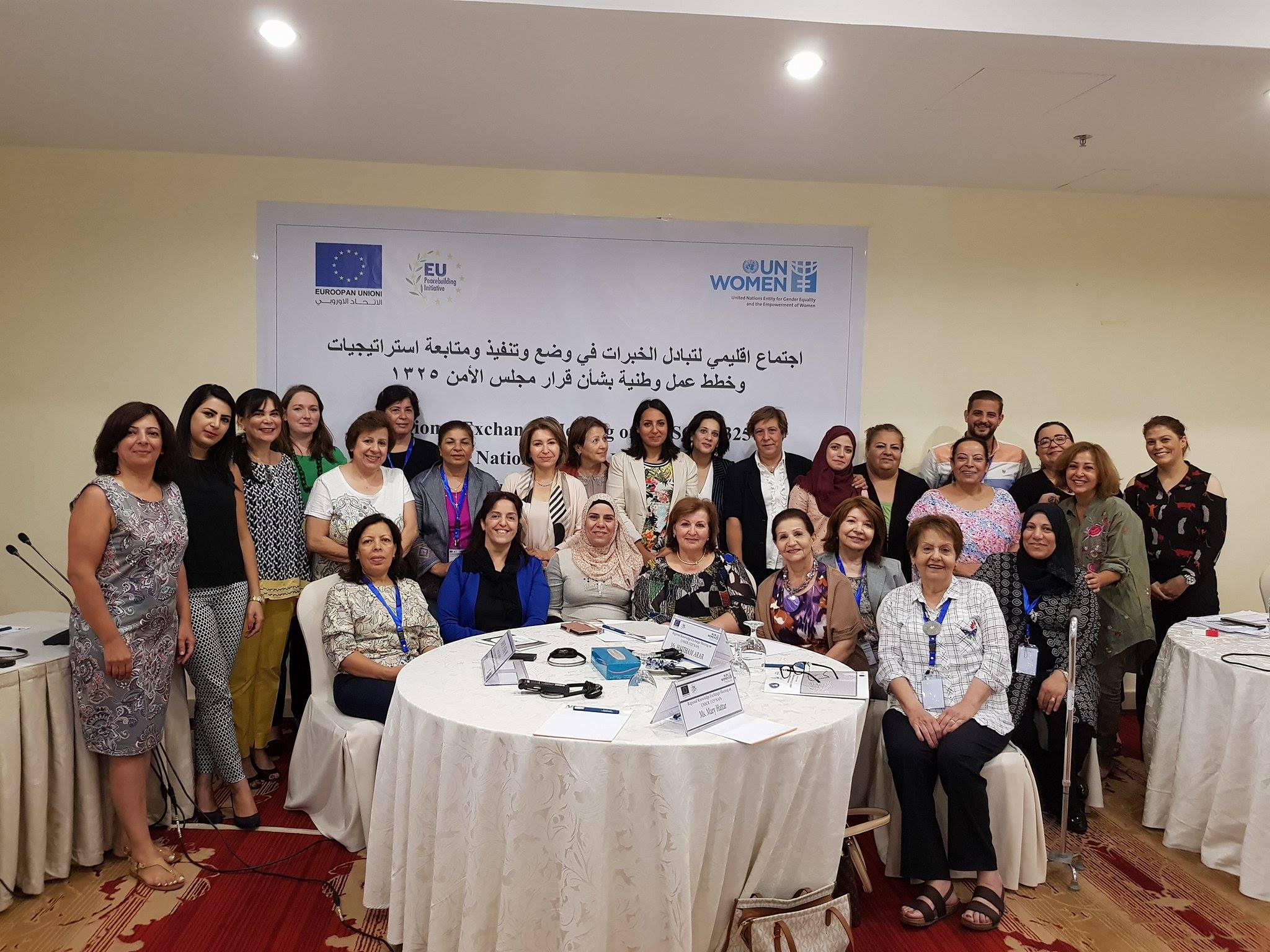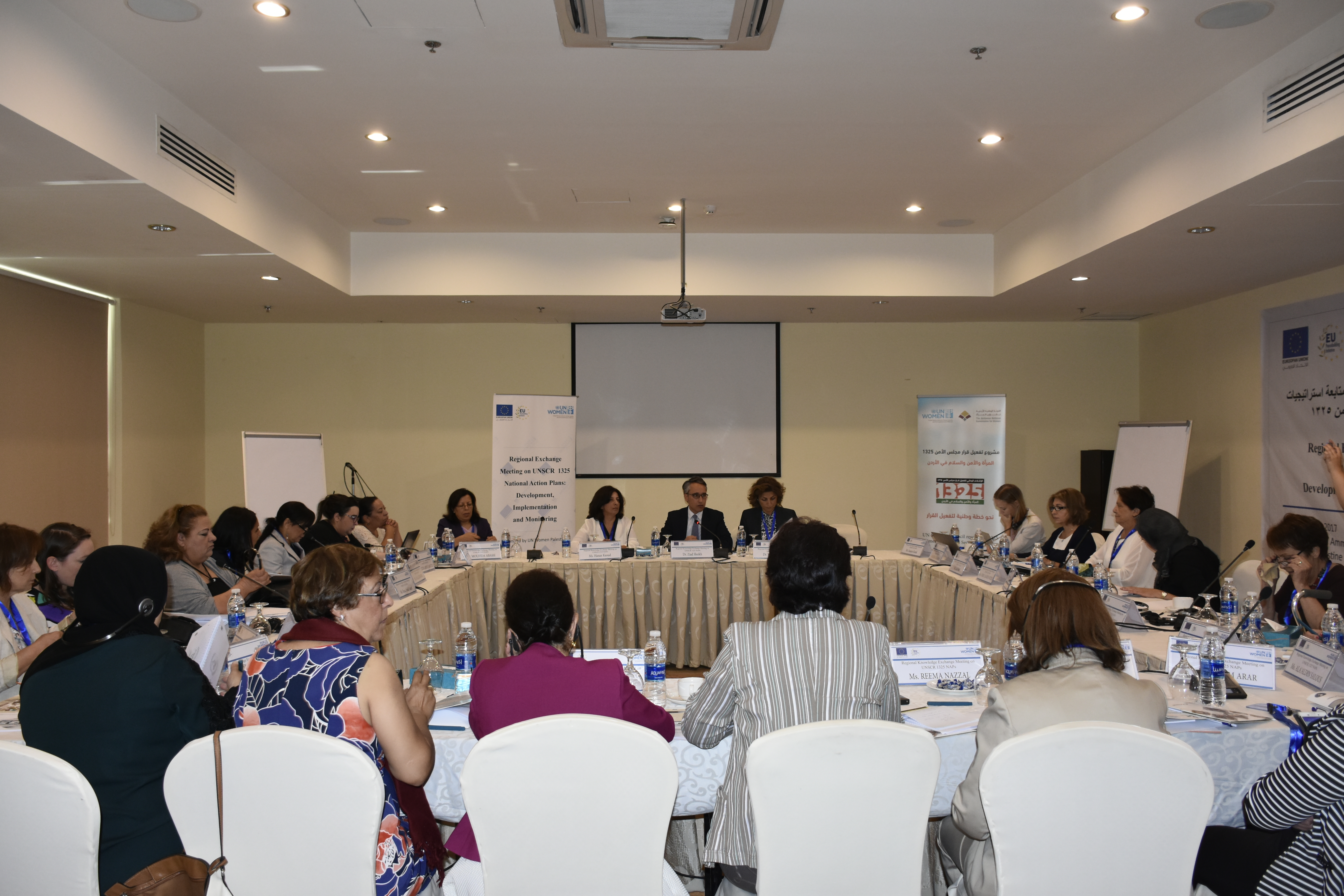Women’s Rights Organizations from Six Arab Countries Call for Joint Advocacy Efforts on Women Peace and Security
Date:
A regional meeting on advancing the implementation of National Action Plans on UNSCR 1325 took place in Amman on 22-23 August (Photo: Sana Dmoor)
“This is the first time leading women rights organizations in the region gather and benefit from the experiences of neighboring countries, and draw on future directions together,” all participants said with one voice at a recently held meeting organized by UN Women Palestine in Amman, funded by the European Union.
The two-day regional knowledge exchange meeting, which aimed to advance women’s equal and full participation in peace and security, took place on 22-23 August at Landmark Hotel Amman and was attended by 30 representatives from women’s rights organizations from six Arab countries including UN Women Regional Office for Arab States, UN Women Jordan Country Office, and Women International League for Peace and Freedom (WILPF).
The meeting provided a platform for stimulated discussions to explore new and more integrated approaches to develop and monitor the implementation of UNSCR 1325 National Action Plans (NAPs) in six participating countries. Participants from Palestine, Jordan, Iraq, Tunisia, Egypt, and Lebanon as well as The League for Arab States and Karama network, had an opportunity to share and learn from processes and best-practices on developing and implementing NAPs from different countries in the region.
Dr. Salma Nims, Secretary General of the Jordanian National Commission for Women, emphasized the importance of including youth in the UNSCR 1325 NAPs to address the increasing threat of radicalization in the Arab region. Dr. Nims also added that it is important to include more Arab countries in the region in the on-going communication and South-South exchanges, such as Yemen, Syria, Morocco and Libya, for the implementation of the NAPs to become more inclusive.
On the other hand, increased involvement of civil society in the NAPs was highlighted by Ms. Hanan Kaoud, Peace and Security Programme Manager at UN Women Palestine, who also emphasized the necessity to comply with existing international laws and resolutions when implementing NAPs.
The need for joint advocacy efforts and adequate allocation of resources for the better implementation of UNSCR1325 was also highlighted by Mr. Ziad Sheikh, UN Women Jordan Representative. “Our shared responsibility is to ensure that National Action Plan on UNSCR 1325 are grounded in strengthened national capacities, the active engagement of civil society and women’s groups, and sustained through the allocation of adequate human and financial resources,” he added.
During the last session of the meeting, recommendations were made from various participating organizations, including engaging more women rights organizations in the policy and strategic processes of League of Arab States and increasing the involvement of governments and international communities in ending violence against women and girls.
Participants also reached a consensus for the urgency of a coordinated response to the situation of Palestinian and Arab women and girls in the region especially in-conflict countries, and the necessity to create a firm joint action to protect refugee women and girls.
“We need to promote a coordinated effort among women’s rights organizations in the region to work together to positively affect all Arab women and girls, especially those in need,” participants concluded, hoping for an immediate regional cooperation for a wider and sustainable impact.

The participants from six Arab countries had an opportunity to share and learn from best-practices on implementing NAPs from different countries in the region (Photo: UN Women)
The meeting is part of UN Women Palestine Office ongoing Project “Advancing the Implementation of UNSCR 1325 in occupied Palestinian territory (oPt) (2015-2017)”, funded by the European Union.
